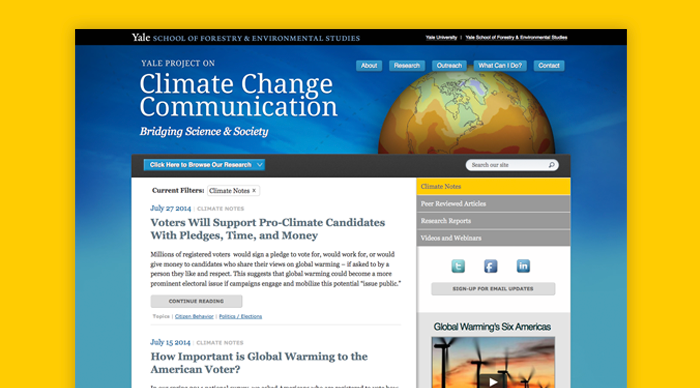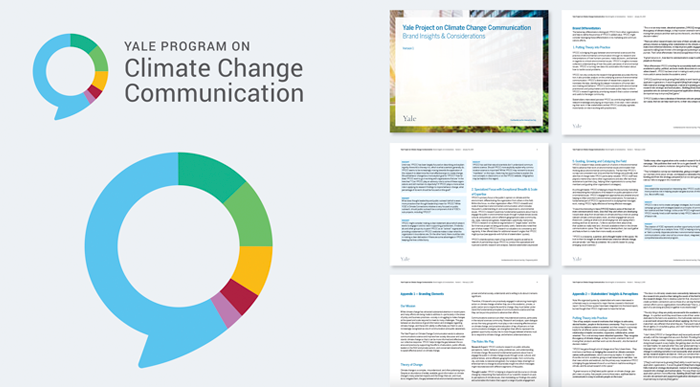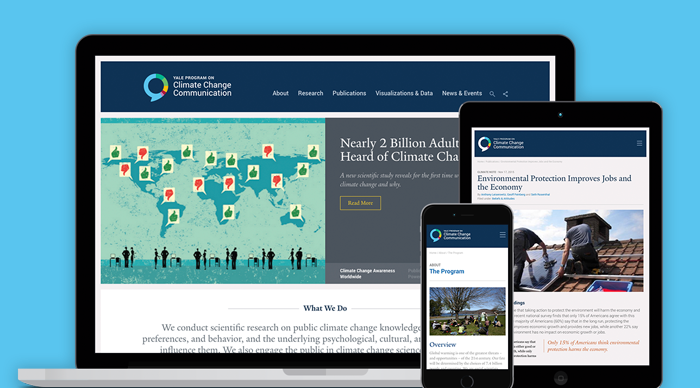The Yale Program on Climate Change Communication (YPCCC) is the preeminent climate change nonprofit exploring the science behind climate change awareness, attitudes, policy, and behavior. To build the public and political will for climate action, YPCCC conducts pioneering research from surveys, experiments, and interviews to statistical models and participatory GIS mapping. Looking to strengthen their brand, rethink their strategy for publishing research reports, and create a climate change website design that would increase their reach and influence, YPCCC asked Constructive to connect the dots between their mission and how their brand delivered on it.
A Climate Change Website Design Failing to Communicate
The YPCCC’s existing website was designed much more like a blog than the online home of the leading nonprofit dedicated to delivering climate change communications research and data. The climate research institute’s website design was confusing and lacked the structure and level of depth or detail needed to empower people to explore YPCCC’s diverse activities and issues. Focused more on posts than on the mission, the website failed to tell the nonprofit’s brand narrative or increase people’s understanding of the critical context into YPCCC’s mission to raise awareness of how the public understands and acts on climate change.
For a content-heavy nonprofit website, YPCCC has a major flaw that made it too difficult for people to engage with content—ineffective website search and navigation that stopped visitors from quickly finding what they were looking for. And of the biggest concern to Yale’s team was that YPCCC’s volumes of pioneering climate change communications research were trapped in large PDF reports that were difficult to access, limited search engine optimization, and were not mobile-friendly.
Taken together, the nonprofit research institute’s website design failed to present the YPCCC as the leader in climate change communications that it was.
Climate Change Branding that Speaks to Strategy
One of the most common misconceptions about The Yale Program on Climate Change is that they are a research nonprofit that is focused on climate change science. While their work is dedicated to addressing climate change and creating a more sustainable planet, they are focused exclusively on the science of communications related to climate change, which is essential to how we understand and address it.
To make this distinction clear and build the brand around what makes it so different and interesting, we started with a participatory brand strategy process. Working with YPCCC’s leadership, we explored the nonprofit research institute’s mission, brand values, vision for the future, audience relationships, and the differentiated ways the brand delivered value. We then developed a Brand Assessment that synthesized insights and provided recommendations for the strategic direction of the nonprofit’s brand; then created a brand positioning and messaging platform that tells the YPCCC’s story with clarity and impact. Then, to make strategy tangible, we explored logo design concepts that communicate the YPCCC’s unique intersection of communications science, climate change, and data.
The resulting brand strategy and visual identity effectively captures the spirit and value of YPCCC’s commitment to scientific rigor in the climate awareness and communications field—eliminating brand mis-perceptions and clearly positioning the research institute in its space.
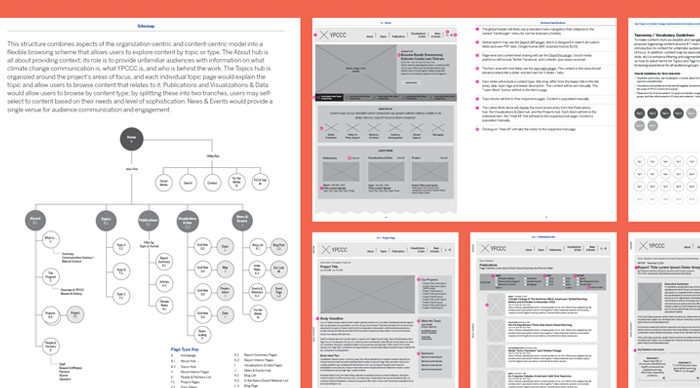 Effective UX Design for a Content-Heavy Research Nonprofit Website
Effective UX Design for a Content-Heavy Research Nonprofit Website
YPCCC’s existing website was filled with thousands of pieces of content that were organized by topics, programs, types, and more. Unfortunately, the website’s information architecture failed to connect them in ways that would drive content engagement. To surface insights from YPCCC’s data-heavy, long-form research content—and encourage audiences to spend time reading it—we needed to focus on designing simple, clear navigation for the user experience.
To do so, we started at the content level, restructuring the nonprofit website’s content taxonomy to better communicate YPCCC’s mission focus, providing a framework of issues and topics that structure the database architecture and site navigation, making it easier for audiences to access and explore content. We then designed information architecture that both provided the diversity of page layouts needed to support the wide range of content and functionality that research institute nonprofit websites need. To deepen content engagement and encourage longer website visits, we then designed dynamic content relationships throughout the site experience—automatically surface related research, resources, and experts throughout the experience.
Designing the Website that a Climate Change Communications Deserves
With the nonprofit brand strategy, branding, and UX design in place, we were now ready for the exciting work of transforming everything into a standout website that would strengthen YPCCC’s position as the leader in its field. When designing websites for nonprofit research institutes, it’s essential to emphasize credibility and expertise because leadership to advance the mission depends on always maintaining an objective focus on the work.
The new nonprofit website design works within Yale’s broader brand ecosystem while standing out. Color, typography, and imagery are focused on engaging with YPCCC’s influential research and insights as the central focus— with clear navigation and clean layouts that make content easily accessible. Strong typographic hierarchies and editorial design techniques emphasize legibility for longer reads, and robust related content relationships elevate insights and encourage longer visits.
On the back-end, Yale needed a good CMS for content-heavy website. We customized WordPress making publishing easy for their small team. A combination of component-driven design, flexible content fields, and master page templates give site admins great flexibility in designing pages based on their content, while maintaining brand consistency and integrity.
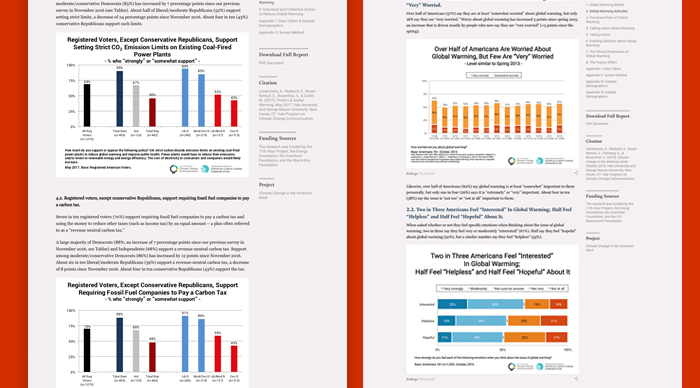 A Publishing Strategy to Drive Publishing Digital Research Reports
A Publishing Strategy to Drive Publishing Digital Research Reports
Because the YPCCC is a nonprofit research institute, similar in ways to a nonprofit think tank, publishing extensive, long-form research reports is essential to their work. When it comes to digital publishing strategies, there are two main approaches that nonprofits can take—a PDF-first approach to publishing research reports or publishing digital-native research reports. In YPCCC’s case, it was important to them that they do both, so we set out to design a new system and workflow that gave them the ability to publish digital-native reports and also deliver PDFs for every digital report they published. They also needed to streamline their cumbersome PDF-only report publishing process to make it easier for them to get their work out.
YPCC’s new publishing system deliver insights on important issues like International Public Opinion on Climate Change, leading with HTML-first reports that have executive summaries, interactive footnotes, embedded data visualizations, and more to make it easy for people to engage with the research.
The resulting hybrid online publishing system adds flexibility and efficiency by supporting both HTML and PDF publishing workflows. Report summary pages deliver at-a-glance takeaways while full HTML reports make Yale’s long-form content more accessible and shareable for audiences online. And for those who still prefer, PDF reports remain available to support offline reading and printing.
The Results
“We needed a website that was more effective in engaging multiple audiences and which would integrate a wealth of legacy content with our ongoing publishing. Constructive’s team achieved all our goals and has worked for years to support our growth since. Flexible, responsive, creative, forward-thinking: all traits you hope for in a partner, and Constructive has them all.”
Anthony Lesierowitz, Senior Research Scientist at Yale School of the Environment
—————————
Learn More About Our Work
Get an up-close and detailed look at this project in our visual case study or explore Constructive’s design for climate change and environmental nonprofits.




